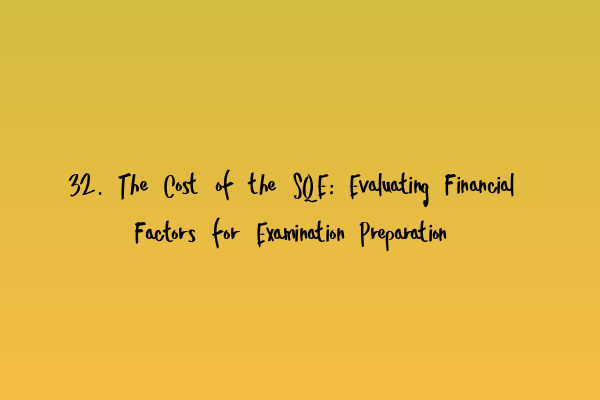The Cost of the SQE: Evaluating Financial Factors for Examination Preparation
Preparing for the Solicitors Qualifying Examination (SQE) is an important milestone for any aspiring solicitor. However, it’s crucial to consider the financial implications associated with the exam. In this blog post, we will discuss the various cost factors involved in SQE preparation and provide tips on how to evaluate them effectively.
1. Course Fees
One of the primary financial considerations for the SQE is the cost of preparatory courses. There are several providers offering SQE courses, each with their own fee structures. It is essential to research and compare different options to find the most suitable course for your needs and budget.
Keywords: SQE course fees, preparatory courses, comparison, budget
2. Study Materials
Aside from course fees, you will also need to invest in study materials such as textbooks, revision guides, and practice papers. These resources are crucial for exam success and should be factored into your overall budget. Look for discounts or package deals to save money on study materials.
Keywords: study materials, textbooks, revision guides, practice papers, discounts
3. Exam Fees
The SQE consists of two stages, and each stage has an associated exam fee. These fees can add up, so it’s vital to plan and account for them in your budget. Check the exam regulator’s website for the most up-to-date information on fees and payment methods.
Keywords: exam fees, two stages, exam regulator
4. Travel and Accommodation
If you are attending an in-person course or taking the exam in a different city, you will need to consider travel and accommodation costs. These expenses can vary significantly based on your location and preferences. Look for affordable accommodation options or consider carpooling with fellow candidates to save on travel expenses.
Keywords: travel costs, accommodation expenses, in-person course, different city
5. Time Commitment
While not directly related to finances, the time commitment required for SQE preparation is a crucial factor to consider. Balancing work, study, and personal commitments can be challenging, particularly if you are working full-time. Assess your availability and consider any potential impact on your income during the preparation period.
Keywords: time commitment, balance, full-time work, income impact
6. Additional Support
Some candidates may opt for additional support beyond the standard preparatory courses. This includes private tutoring, mentoring, or extra practice papers. While these services can be beneficial, they come at an additional cost. Evaluate the potential benefits against the financial outlay before deciding to invest in additional support.
Keywords: additional support, private tutoring, mentoring, practice papers
Conclusion
Preparing for the SQE requires careful financial planning. By considering the various cost factors involved, such as course fees, study materials, exam fees, travel, accommodation, time commitment, and additional support, you can evaluate and manage your finances effectively. Take the time to research, compare options, and budget accordingly to ensure you are well-prepared for the examination without compromising your financial stability. Good luck!

Leave a Reply